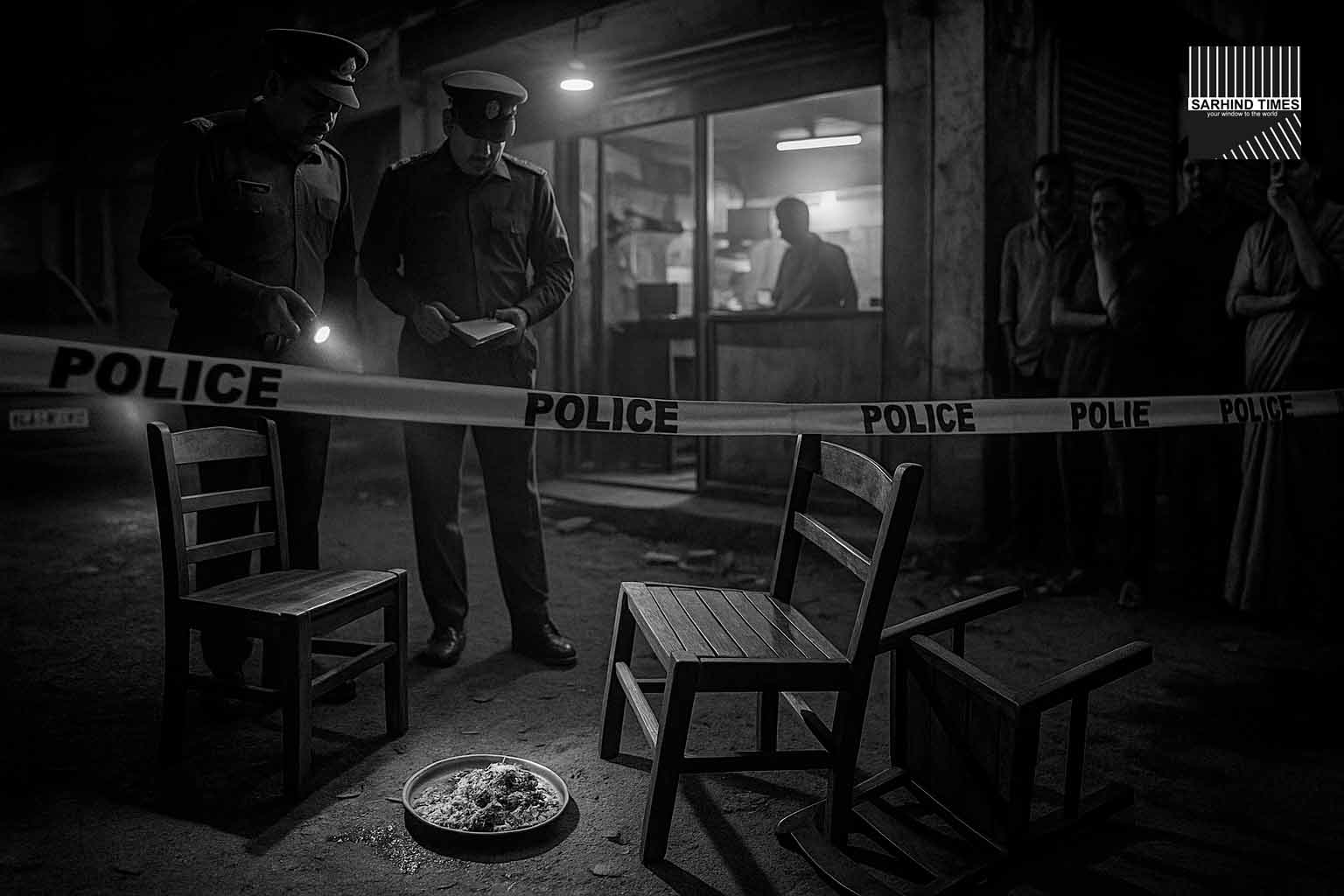By Sarhind Times Bureau | Ranchi | October 20, 2025
Summary
A 38-year-old restaurant owner was shot dead in Ranchi after an argument allegedly over a food order turned violent. Police suspect the motive goes beyond a mere “wrong dish,” hinting at a long-simmering property dispute. The murder has sparked shock, protests, and renewed concern about rising gun violence in urban Jharkhand.
The Incident: A Dinner That Ended in Death
On Sunday night, what began as a routine dinner service at Mumtaz Biryani House, a small eatery on Ranchi’s Main Road, turned deadly. Around 8:45 p.m., a customer—identified by police as Aman Khan (26)—ordered biryani for takeaway. Moments later, he returned, furious, claiming the order was “vegetarian instead of chicken.”
Witnesses say the owner, Mohammad Imran Sheikh (38), tried to explain that it was a kitchen mix-up and offered to replace it. But the argument escalated. The customer threw the food packet, shouted threats, and left. Within 20 minutes, two men on a motorcycle arrived, walked into the eatery, and fired three shots at close range. Imran collapsed behind the counter as panic gripped the lane.
He was rushed to RIMS Hospital, where doctors declared him brought dead. Police recovered three empty cartridges from the scene.
Police Investigation: More Than a Food Dispute
Ranchi SSP Chandan Sinha confirmed to Sarhind Times that a case has been registered under Sections 302 (murder) and 120B (criminal conspiracy) of the Indian Penal Code, along with provisions of the Arms Act.
“Initial evidence suggests the argument may have been a trigger, but not the root cause,” Sinha said. “We are investigating business and property links between the accused and the victim.”
According to police sources, Imran had been embroiled in a property dispute over a rented shop space in the Upper Bazaar area. A local MLA has hinted that “the biryani quarrel was a cover for something planned.”
Investigators are examining CCTV footage from adjacent shops. Early footage shows the shooter wearing a helmet and a dark jacket, escaping toward Harmu bypass.
The Victim: A Self-Made Entrepreneur
Imran Sheikh was known as a polite, hardworking man who had expanded his small biryani stall into a full-fledged restaurant employing nine workers. A father of two daughters, he often worked 14-hour days.
“He started with a handcart after COVID lockdowns,” said Aftab Alam, his cousin. “He built everything from scratch—now look how it ended.”
Friends describe him as generous, occasionally offering free meals to labourers and students. “People came for his food, stayed for his smile,” said Ritu Kumari, a regular customer.
Witness Accounts: Chaos and Fear
Eyewitnesses told police the entire shooting lasted less than a minute. One of the workers, Ramesh Das, recalled:
“We thought it was a cracker. Then I saw sahib fall. We hid in the kitchen until they left.”
Neighbours reported hearing three gunshots followed by screams. The street was crowded, yet the assailants escaped amid confusion. By the time police arrived, traffic had jammed the lane. Residents later gathered candles outside the shuttered eatery, demanding justice.
Protests and Political Reaction
By Monday morning, local trade unions and restaurant associations staged demonstrations outside the Deputy Commissioner’s office, demanding stricter policing and gun control. Shops in the area downed shutters for two hours in solidarity.
Chief Minister Champai Soren condemned the killing, calling it “a shameful act that insults human decency.” He directed the police to form a Special Investigation Team (SIT). The opposition BJP accused the state government of “failing to protect small traders.”
Former Chief Minister Raghubar Das tweeted:
“From Ranchi to Jamshedpur, law and order is crumbling. The state cannot be run on sympathy tweets.”
Crime Pattern: A Rising Trend
According to Jharkhand Police data, Ranchi has seen a 27% rise in shooting incidents in 2025 compared with the previous year. Most are linked to extortion or local rivalries. Easy access to illegal firearms—especially from Munger and Gaya in Bihar—fuels the crisis.
“Country-made pistols sell for ₹5,000. Even teenagers can buy one,” said Inspector Vijay Kumar, a member of the Anti-Gang Task Force.
Last month, a jeweller was shot dead in Doranda; earlier, a college student was injured during a robbery in Kokar. Despite periodic crackdowns, urban Ranchi remains awash with weapons.
The Food-Anger Connection
Sociologists point to an alarming rise in “instant rage crimes.” A study by the National Crime Records Bureau (NCRB) found that 11% of urban homicides in 2024 began with trivial disputes—road rage, restaurant fights, or social-media spats.
“When social stress and easy weapons intersect, small sparks become fatal,” explained psychologist Dr Rupa Nair. “This is not about biryani; it’s about emotional volatility and impunity.”
Voices from the Market
Nearby shopkeepers are still shaken. Arjun Prasad, who runs a stationery store two doors away, said:
“Business is down. Customers are scared to come at night. We want police patrols every evening.”
Food vendors fear lasting stigma. “Now people joke, ‘Eat carefully in Ranchi,’” said Sunil Yadav, owner of a snack stall. “But we feed people, we don’t fight.”
Restaurant owners plan to install CCTV cameras and panic alarms collectively under the Ranchi Restaurant Safety Initiative, an idea inspired by the Delhi Traders’ Association model.
Legal and Forensic Steps
Police have sent bullet casings to the Forensic Science Laboratory in Hazaribagh for ballistic matching. The weapon type—believed to be a 7.65 mm country-made pistol—will be traced to illegal manufacturing hubs.
Investigators are also analysing phone records of the prime suspect, Aman Khan, and his associate. Two suspects have been detained from Doranda after mobile-tower triangulation.
“We’re moving fast,” said SSP Sinha. “The killers will be in custody soon.”
Community and Religious Leaders React
Both Hindu and Muslim leaders in Ranchi condemned the violence jointly. A peace march, organised by interfaith group Ekta Samaj, saw hundreds walk from Albert Ekka Chowk to Main Road with placards reading “Food should unite, not divide.”
“Imran served people of all communities,” said Pandit Ramesh Shukla, who participated in the march. “This crime insults humanity.”
Such cross-community solidarity drew appreciation online, offering a rare moment of unity amid grief.
The Family’s Demand
Imran’s wife, Nazia Begum, broke down while speaking to reporters:
“He worked so hard for us. Why would anyone do this for one plate of food?”
She has appealed to the government for compensation and protection. Women’s groups in Ranchi have launched a fundraiser to support the daughters’ education.
Broader Implications: Safety of Small Entrepreneurs
The tragedy has reignited debate on safety for small-business owners. Ranchi’s eateries, pharmacies, and jewelers often operate late into the night with minimal police visibility.
“Big malls have guards and cameras. The small man has faith and nothing else,” remarked economist Dr Shailendra Prasad, adding that fear-driven shutdowns hurt local economies.
Traders are now pressing for a “Safe Business Corridor” policy with 24×7 police patrols, CCTV linkages, and insurance incentives for compliance.
Digital Outrage
The hashtag #JusticeForImran trended on X and Instagram within hours. Users posted candle emojis, poems, and demands for speedy trial. Several popular food bloggers shared Imran’s story, calling him “Jharkhand’s Biryani King.”
Political parties, too, joined the digital mourning. Congress leader Priyanka Gandhi wrote, “This incident reveals the deeper sickness of anger and lawlessness. Imran deserves justice and India deserves peace.”
Psychological Aftermath: Fear on the Frontline
For service-industry workers—waiters, delivery staff, security guards—every altercation now feels loaded. Ankit Mehta, a delivery rider, said,
“We apologise even when the customer is wrong. You never know who’s carrying a gun.”
Counselling NGOs have offered trauma support for witnesses. “Post-incident fear spreads silently,” said Dr Nair. “Community healing is essential.”
Political Fallout
Opposition parties accuse the ruling coalition of failing to control crime. BJP leaders announced a statewide protest march under the banner “Suraksha Sankalp.” The state government countered by highlighting falling overall crime rates and promising swift justice in this case.
Insiders say the issue may influence the forthcoming municipal polls, where safety and governance dominate voter concerns.
Editorial Perspective
Imran Sheikh’s killing is not just a crime story; it’s a mirror to a society fraying at its edges—where tempers flare faster than justice responds. Jharkhand must confront the culture of everyday rage and the flood of illegal firearms that make every argument potentially lethal. “Wrong dish” or not, the right question is: why has human life become so cheap?
#Ranchi #Crime #LawAndOrder #Jharkhand #PublicSafety #GunViolence #JusticeForImran #SarhindTimes #Society #UrbanIndia




+ There are no comments
Add yours